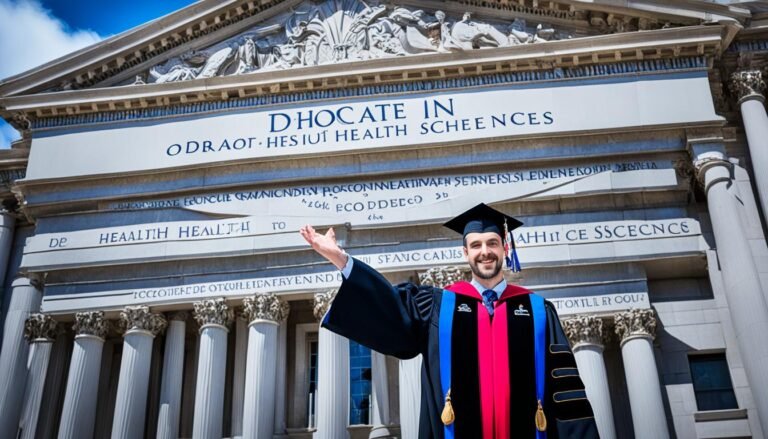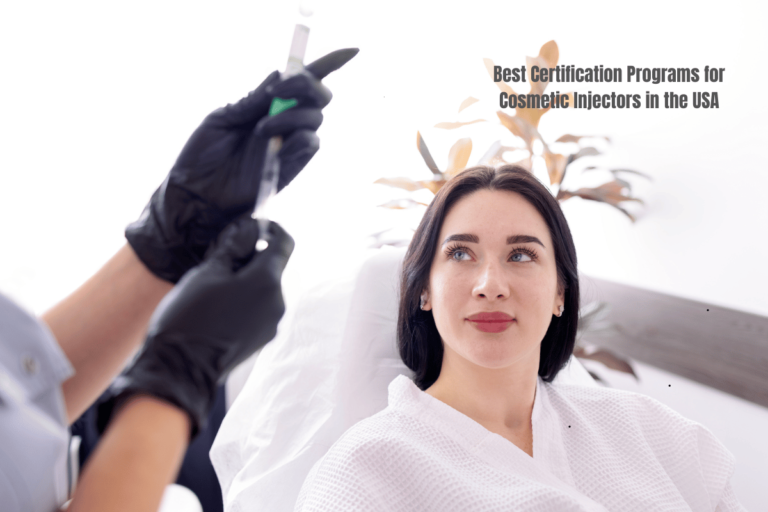Best Practices for Becoming a Nuclear Medicine Technologist (NMTCB)
Nuclear medicine technologists are key in diagnosing and treating health issues. With the push for advanced healthcare, the need for experts in nuclear medicine is growing.
Thinking about becoming a nuclear medicine technologist? Or wanting to boost your skills in the field? Getting certified by the Nuclear Medicine Technology Certification Board (NMTCB) is a must. This guide will offer tips and top practices for your journey to getting certified as a nuclear medicine technologist.
Key Takeaways:
- Obtaining certification from the NMTCB is crucial for aspiring or practicing nuclear medicine technologists.
- Following best practices, such as studying with NMTCB-approved resources, can increase your chances of success on the certification exam.
- Continuing education and staying up-to-date with professional organizations and resources are essential for a successful career as a nuclear medicine technologist.
- Nuclear medicine technology offers promising job opportunities with a projected growth rate of 7% from 2019 to 2029.
- Adhering to professional practice standards ensures safe and effective patient care as a nuclear medicine technologist.
Training and Education for Nuclear Medicine Technologists
To become a nuclear medicine technologist, you’ll need good schooling and training. The Joint Review Committee on Educational Programs in Nuclear Medicine Technology issues associate’s or bachelor’s degrees through its approved programs. These lessons are vital for a successful career as a technologist.
Students must complete a full year of clinical work, under the Nuclear Medicine Technology Certification Board‘s rules. This means working under supervision to learn the job hands-on. They need to clock at least 900 hours during this time.
Before entering clinics, students will also study basics like anatomy, physics, and math. These fundamental courses lay the ground for a successful career. They help students understand the work deeply.
Training Program Accreditation
The JRCNMT ensures that programs meet high education and training standards. Completing an accredited program shows a technologist has gotten a top-notch education. It’s a key step towards becoming a qualified nuclear medicine technologist.
Core Training Components
In their programs, technologists-in-training take part in classes, labs, and real-life medical settings. This mix offers a complete education. It helps them build the technical and thinking skills they’ll need on the job.
Important topics in a nuclear medicine program include nuclear physics, safety, and how to safely use radioactive medications. They also learn how to read medical images, plus how to work with patients and check the quality of their work.
It’s crucial for these professionals to keep learning. The field of nuclear medicine is always growing, so ongoing training is a must. The rules on what to study might change depending on where you are. So, future technologists should check the NMTCB rules and talk with their school advisors.
NMTCB Certification Exam
The NMTCB certification exam checks nuclear medicine technologists’ knowledge. It’s a big step toward certification. This test measures skills like keeping patients safe, caring for them, and reading images well.
Studying hard is key for this exam. There’s a lot to know about nuclear medicine. Help is available through NMTCB-approved guides and resources. Groups like SNMMI and ASRT offer study materials that match the exam.
“Studying with an NMTCB-approved study guide is invaluable in preparing for the certification exam. It not only helps candidates review essential concepts but also familiarizes them with the format and style of questions they can expect.”
Candidates can really boost their expertise with these guides. The material is spot-on, helping them dive deep into important topics. Practice tests are also a great tool to get ready for the real exam.
Benefits of using NMTCB-approved study guides:
- Comprehensive coverage of exam topics
- Aligned with the NMTCB certification exam’s content and structure
- Provides practice questions and answers for self-assessment
- Facilitates familiarity with the exam format and style of questions
Good preparation can make a big difference. Having a strong grasp of nuclear medicine and practical skills is crucial. The exam aims to ensure certified technologists are fully equipped to care for patients well.
| Benefits of NMTCB Certification Exam Preparation |
|---|
| Gains a deep understanding of nuclear medicine technology principles |
| Develops proficiency in performing various procedures |
| Builds confidence through practice exams and self-assessment |
| Aligns with the exam’s content and structure |
| Familiarizes candidates with the exam format and style of questions |
Scope of Practice and Practice Standards
Nuclear medicine technologists get their guidelines from groups like the Society of Nuclear Medicine and Molecular Imaging (SNMMI) and the American Society of Radiologic Technologists (ASRT). They set the rules for what technologists can do, what they should know, and how they should act. Following these rules helps in taking good care of patients safely and effectively.
Jobs for nuclear medicine technologists are looking up. From 2019 to 2029, there’s a 7% growth expected, as said by the Bureau of Labor Statistics.
Nuclear Medicine Technologist Certification Requirements
| Requirement | Description |
|---|---|
| Educational | Completion of an accredited nuclear medicine technology program |
| Clinical Experience | Fulfillment of the required clinical experience hours |
| Certification Exam | Successful completion of the NMTCB certification exam |
| Ethical | Meet the NMTCB’s ethical requirements |
| CPR Certification | Proof of current CPR certification |
Getting certified as a nuclear medicine technologist means more job options. It shows you have the skills and know-how to care for patients well.
Exam Application and Administration
When you’re all set to take the NMTCB certification exam and you qualify, it’s time to apply. The NMTCB provides a clear process on their website for applying and taking the exam. This makes things easier for everyone.
Start by sending in your application at least two months before you want to test. This gives the NMTCB time to check your application. You can get the form and how-to on the NMTCB site.
Once your application is ok, you’ll get an email to confirm it. In this email, you’ll find how to pick your test date. The NMTCB exam is offered all year. This lets you choose a date that suits you.
The NMTCB exam is done on a computer with Computerized Classification Testing (CCT). This way, your skills and knowledge as a nuclear medicine technologist are tested well. What’s more, you get your score right after the test.
As you work through the exam application and taking the test, remember the NMTCB’s rules and deadlines. Following their instructions carefully ensures a smooth process. It’s an important step in your journey to becoming a certified nuclear medicine technologist.
Eligibility and Requirements
To be certified as a nuclear medicine technologist, you need to meet certain criteria. The NMTCB requires candidates to show their dedication and skill in nuclear medicine technology. This is done by meeting the outlined requirements.
Educational Requirements
Candidates must complete a nuclear medicine technology program that is accredited. This could be either an associate’s or bachelor’s degree. The program ensures they gain the necessary knowledge and skills for their job.
Clinical Experience Requirement
It is not just about classes, though. Candidates must also get hands-on experience. This includes 900 hours of supervised practice in actual nuclear medicine procedures. This part of the journey helps them improve their skills on the job.
State and Institutional Regulations
State and institutional rules must also be followed. These can differ, so it’s vital to know the local regulations. This makes sure candidates are fully prepared for their certification wherever they are.
Additional Requirements
There are a few more things candidates need. They must have up-to-date CPR training to handle emergencies. They also must stick to high ethical standards as set by the NMTCB. These steps strengthen a candidate’s application for certification.
Image
Summary of Eligibility and Requirements
| Eligibility and Requirements | Description |
|---|---|
| Educational Requirements | Completion of an accredited nuclear medicine technology program and obtaining a degree. |
| Clinical Experience Requirement | At least one clinical year with a minimum of 900 hours of supervised nuclear medicine technology procedures. |
| State and Institutional Regulations | Compliance with any state regulations or institutional bylaws that may be in place. |
| Additional Requirements | Current CPR certification and adherence to the NMTCB’s ethical requirements. |
Continuing Education and Recertification
After you get your nuclear medicine technologist certification, it’s important to keep learning. To stay certified, you need to meet educational requirements. The Nuclear Medicine Technology Certification Board (NMTCB) sets these standards.
Continuing Education Requirements
Every two years, certified technologists must complete 24 continuing education credits. You can get these credits from things like going to conferences, joining seminars, and taking online classes. The point is to make you better at caring for patients by learning more and increasing your skills.
Approved Educational Activities
It’s key to pick the right activities to earn your credits. NMTCB approved activities should help you grow in your career and be about nuclear medicine. Going to conferences or taking part in workshops is a good idea.
Online courses are also a good choice for getting your credits. They let you learn at your own speed and when you have time. Just be sure these courses are NMTCB approved.
Recertification Fee
Along with education credits, you must pay a recertification fee every two years. This fee supports the certification program, which ensures quality and is recognized by others in the field.
By meeting the education and fee requirements, you show you’re serious about your work. This boosts your career and professional image. It’s essential for your future as a certified nuclear medicine technologist.
Benefits of Continuing Education and Recertification
“Continuing your education and staying certified is essential in nuclear medicine. It keeps you up-to-date, grows your knowledge, and betters your job chances. It also shows you’re dedicated to high standards and great care for patients.”
– Dr. Sarah Thompson, Chief Medical Officer at RadCare Medical Imaging
Staying educated and certified isn’t just about learning new things in your field. It shows your ongoing commitment to growth. This dedication can lead to exciting new roles, leadership chances, and more research opportunities.
Professional Organizations and Resources
Starting as a certified nuclear medicine technologist opens many doors. Join groups like the Society of Nuclear Medicine and Molecular Imaging (SNMMI) and the American Society of Radiologic Technologists (ASRT). These groups offer lots of resources and chances for networking, which can help you grow in your career.
Being part of these groups means you get access to tons of career support. You can read the newest studies and find helpful learning materials. Also, you can go to conferences and webinars to learn about the latest industry trends.
Connecting with others in your field is also key. Meeting with other nuclear medicine technologists can offer great advice. They can share their experiences and give you new perspectives. This might also help you find new job opportunities.
“Joining groups like SNMMI and ASRT has really shaped my career. The chance to network and access educational resources has been priceless. It helps me keep up with new trends and best practices.”
Online Study Guides and Resources
If you’re preparing for the NMTCB exam, look online for study guides. These guides cover important topics like radiation safety and patient care. They’re a big help when preparing for the test.
Choose study materials that meet NMTCB standards and are recommended by SNMMI or ASRT. They often include practice questions and advice from professionals. This can really boost your chances of doing well on the exam.
Remember, studying hard for the NMTCB exam is key. Use all the resources from professional groups and online guides. This will make sure you’re ready and confident on test day.
Conclusion
Becoming a nuclear medicine technologist requires hard work and dedication. First, you must complete an approved training program. Then, gain necessary experience and pass a tough certification test. You’ll need to study hard and use the right materials to do well.
It’s also important to follow the rules set by groups like the Society of Nuclear Medicine and Molecular Imaging and the American Society of Radiologic Technologists. This helps ensure you give patients the best care safely.
To keep your certification, you must never stop learning. Look for chances to learn more, like at conferences or through online courses. Being part of groups like the SNMMI and ASRT can help. They offer support and help you meet other professionals.
Getting certified is the key to a successful career in healthcare. It shows you’re good at your job and helps you find work. With hard work, a love for learning, and a focus on excellence, you can do great things in nuclear medicine. You’ll help patients and make a real difference in their lives.
FAQ
Q: What are the best practices for becoming a certified nuclear medicine technologist?
A: To become a certified nuclear medicine technologist, follow the guidelines from professional groups like the Society of Nuclear Medicine and Molecular Imaging (SNMMI). Also, look to the American Society of Radiologic Technologists (ASRT). You must meet the standards set by the Nuclear Medicine Technology Certification Board (NMTCB). This includes passing a certification test. Make sure to study using NMTCB-approved materials.
Q: What are the training and education requirements for nuclear medicine technologists?
A: To start, complete a program in nuclear medicine technology from an accredited source. This usually leads to either an associate’s or bachelor’s degree. You’ll also need to do a year of hands-on work, which must cover at least 900 hours. It’s important to take courses in anatomy, physics, and math before you start.
Q: What does the NMTCB certification exam cover?
A: The NMTCB exam checks your skills in nuclear medicine. It looks at how you handle radiation safely, take care of patients, and understand images. To do well, use books and guides the NMTCB approves. Being good at your job is key.
Q: What are the practice standards for nuclear medicine technologists?
A: Professional groups like the SNMMI and ASRT lay out what you need to do and think about as a tech. Stick to their rules to keep patients safe and make sure you’re doing a good job. The career outlook is good, with more jobs expected. The Bureau of Labor Statistics thinks jobs will grow by 7% from 2019 to 2029.
Q: How can I apply for the NMTCB certification exam?
A: To apply for the exam, visit the NMTCB’s site. Make sure to do this at least two months before you want to take the test. If they okay your application, they’ll tell you how to pick a day for the exam. The test is on a computer and uses a special system for grading. You’ll find out your score right after you finish.
Q: What are the eligibility requirements for NMTCB certification?
A: To qualify for NMTCB certification, do these things: finish an approved program, complete the clinical hours, and earn your degree. You also need to follow any state or school rules. You must show you know CPR and are a good, ethical person.
Q: How can nuclear medicine technologists maintain their certification?
A: After you’re certified, keep learning to stay certified. The NMTCB wants you to get 24 more education credits every two years. You can do this by going to events or taking courses online. You also need to pay a fee every two years to keep your certification current.
Q: Are there any professional organizations or resources available for nuclear medicine technologists?
A: Yes, groups like the SNMMI and ASRT are there to help. They have the latest information, offer chances to meet others in the field, and plan events. You can also find study materials online to help you with the NMTCB test.
Q: What is the importance of becoming a certified nuclear medicine technologist?
A: Getting your certification shows you know what you’re doing in nuclear medicine. It proves you have the right education, experience, and skills. With this, you’ll find more job options and chances to move up in your career.







